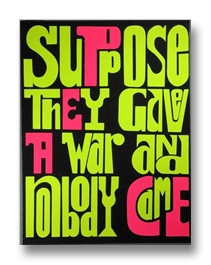2016 Postmortem
Related: About this forumRemember when someone suggested to just declare a victory in Vietnam and pull out?
Wonder whether we can do something like that with the Republicans. Declare that they won - but without giving in anything, of course - just to calm them and save their inflated ego - and go back to run the government.
No, I don't suppose it can work..
Rowdyboy
(22,057 posts)He was one of the "good Republicans" (back when there was such a creature) and when he retired, Pat Leahy took his place.
SheilaT
(23,156 posts)Oh, well, someone said it first and no doubt others repeated it.
For Vietnam it might have worked. The current situation, no. Because for Republicans, especially the TeaParty wing, victory means they get to slash everything that helps anyone, and cancels the ACA entirely.
marble falls
(57,097 posts)December 13, 2011
“Suppose they gave a war and nobody came.”
THE ORIGINAL INSPIRATION FOR THE SIXTIES SLOGAN:
“Sometime they’ll give a war and nobody will come.”
Carl Sandburg (1878-1967)
American poet and writer
A line from Sandburg’s epic prose poem The People, Yes (1936)
In the 1960s, several variations of an anti-war slogan began appearing on posters, in print and in songs. The version that became most common (as shown by the comparatively huge number of Google hits it gets) is “Suppose they gave a war and nobody came.” Other variations include “Suppose they gave a war and no one came” and “What if they gave a war and nobody came.” It’s not certain who coined the most familiar version, but this much is clear: all of the various iterations of the saying are ultimately descended from a line in Carl Sandburg’s book-length ode to America and it’s citizens, The People, Yes, first published in 1936.
marble falls
(57,097 posts) ?imgmax=800
?imgmax=800
same page as above
THE EVOLUTION OF THE SIXTIES SLOGAN:
“Suppose they gave a war and nobody came.”
Possibly coined by James R. Newman
American mathematician, writer and editor of Scientific American magazine
In the 1960s, several updated versions of Carl Sandburg’s line became popular. They were often used in the context of opposition to the Vietnam War. The most common version, “Suppose they gave a war and nobody came,” was used as a slogan on posters that were sold in Hippie shops in the late Sixties (like the blacklight poster shown at left). It was also used as the title of a comedy movie in 1970, giving it even broader recognition. Some posts on the Internet claim the now familiar words were first written by Bertolt Brecht in the 1930s. However, they give no source and I couldn’t find one, so I deem that claim doubtful. (As Abraham Lincoln said, “The problem with Internet quotations is that many are not genuine.”)
In contrast, the origin of the variation “Suppose They Gave a War and No One Came” is well documented. It was used as the title of a widely-read article written by the American poet and author Charlotte E. Keyes (1914-1980). The article, about her growing admiration for the anti-war activism of her son Gene, was published in the October 1966 issue of McCall’s magazine. Charlotte’s other son happens to be the quote and phrase maven Ralph Keyes. He noted in his excellent book The Quote Verifier (2006) that his mother saw the phrase “Suppose they gave a war and nobody came” in a 1961 letter to the editor in The Washington Post, written by James R. Newman. Newman was referencing, but apparently misremembering, Sandburg’s line. Charlotte cut out and kept the letter for future reference and later adapted the title of her article from it. Newman may or may not have coined “Suppose they gave a war and nobody came.” That paraphrase of Sandburg may already have been floating around at the time. However, I found no use of those words dated earlier than Newman’s 1961 letter in any newspaper archive or anywhere else online. So, he may deserve credit for creating the Sixties slogan (though perhaps inadvertently.)
cali
(114,904 posts)it got almost immediately condensed.
<snip>
During the Vietnam war, Aiken is widely believed to have suggested that the U.S. should declare victory and bring the troops home. Actually, what he said was that "the United States could well declare unilaterally ... that we have 'won' in the sense that our armed forces are in control of most of the field and no potential enemy is in a position to establish its authority over South Vietnam," and that such a declaration "would herald the resumption of political warfare as the dominant theme in Vietnam." He added: "It may be a far-fetched proposal, but nothing else has worked."[6]
He was a proponent of many progressive programs such as Food Stamps and public works projects for rural America, such as rural electrification, flood control and crop insurance.
http://en.wikipedia.org/wiki/George_Aiken
question everything
(47,483 posts)of all people, a Citibank Employee, who returned to Vietnam to assist the exit of about 100 Vietnamese who were bank employees and their families. There was so much chaos those last days before the fall of Saigon, that even his crazy ideas got them through.